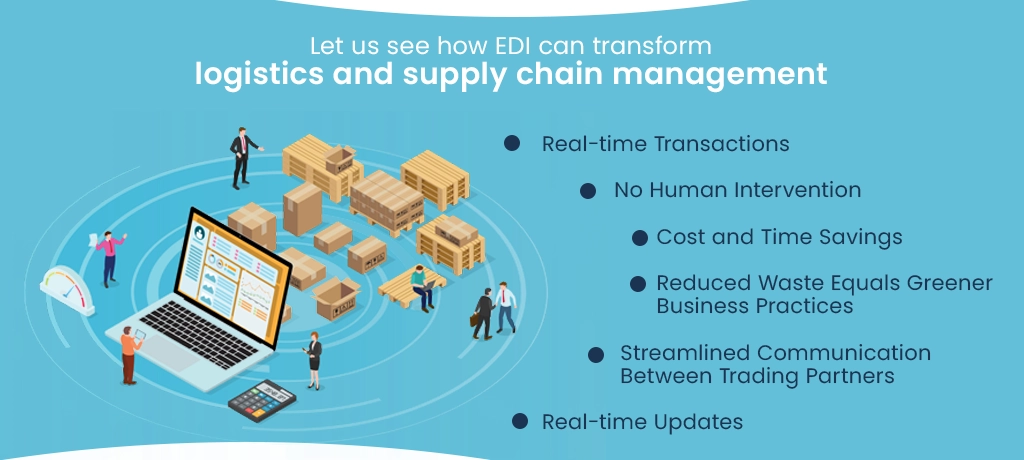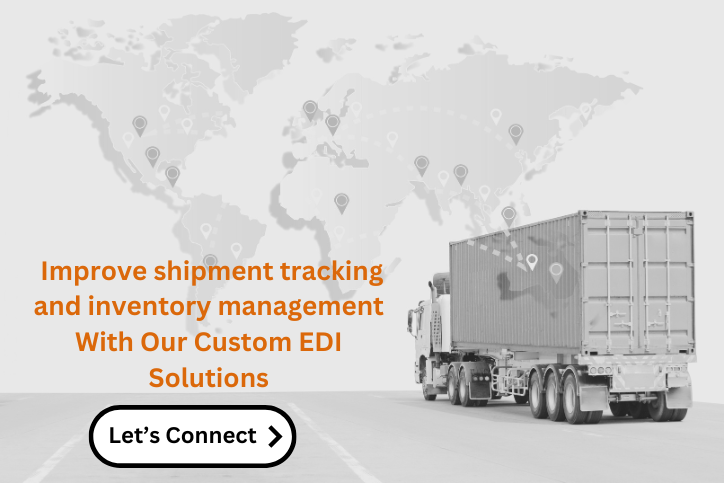Table of Contents
Exploring the tech age, EDI in Logistics is a key part for firms looking to keep their automated actions and talks strong. Indeed, as firms grow, the rising use of automation drives them toward more powerful results. Modern sellers, makers, and logistics helpers, wrapped in a multi-channel business air, meet the crucial job of quickly and rightly reviewing and passing on key information like orders, invoices, moving data, catalogs, and costs.
With the world opening up more for better export and import chances, many companies see a boost in growth. It’s not just about goods and services made outside of borders but also about their competitive strength, even when compared to local rivals. This big global move in the world market calls for smart planning, which brings logistics and supply chain steps at its core. So, actions like managing stock, sending to suppliers, paying invoices, and processing orders are easily handled.
Electronic Data Interchange (EDI) makes these actions much easier, and companies are thus searching for a skilled EDI provider. These providers are great at offering product engineering services that smoothly add EDI to the business structure. Thus, reaching goals becomes more streamlined and tactically matched with the market’s changing needs, ensuring firms stay competitive and work with increased efficiency and accuracy.
Electronic Data Interchange (EDI)
Let’s dive into Electronic Data Interchange (EDI) in Logistics. We see a future where data exchanges from computer to computer boost dealings between different business trading partners. With a history of about 50 years, EDI solutions, first made by the U.S. transportation industry, set a standard for electronic talks between sellers and buyers, showing a strong paperless advantage. This big change didn’t just remove the need for people to be involved and brought big financial savings for businesses.
Adding EDI to businesses slashes the ongoing money, work, and time commitments linked to buying, printing, working on, and delivering paper documents. The crucial nature of adopting this technology lies in its ability to help B2B companies carry out dealings electronically. Moreover, EDI service providers have built a platform where businesses, no matter their size, can rightly meet their varied technical and business needs while also getting support and resources for effective management.
How EDI Can Transform Supply Chain Management
Diving into the tech world, EDI in Logistics reveals change-making possibilities, especially in Supply Chain Management. EDI plays a key role by being efficient and effective, becoming vital in making operations smoother and strengthening strategic ties throughout the supply chain.
Looking into EDI in supply chain unveils a cascade of benefits impacting various operational facets, such as:
- Trimming down lead times
- Saving costs related to documentation processing
- Eradicating procurement blunders
- Providing clear inventory status data
- Fortifying strategic partnerships across the supply chain
Paving the way for how EDI in supply chain management morphs the operational landscape, we delve into its transformative features:
- Executing real-time transactions
- Sidestepping the need for human intervention
- Ensuring cost and time economies
- Cutting down waste, which equals adopting greener business practices
- Facilitating streamlined communication among trading partners
- Providing real-time updates
EDI further orchestrates a seamless interchange of pivotal documents in the supply chain as below:
- Orders and their respective acknowledgments
- Order amendments
- Notifications related to shipments
- Invoices and remittance advice
- Requests concerning routing instructions and subsequent routing guidelines
- Details regarding organizational relationships
- Reports concerning the commission of sales
- Planning schedules coupled with release capability
- Price/sales catalogs and requests for quotations
- Specifications and technical information
In essence, EDI stands out as a fulcrum around which supply chain management pivots, offering myriad benefits that stretch from operational efficiency to strategic alliance enhancement across the various supply chain nodes.
Transformation of logistics and supply chain management:
Let’s explore how EDI in Logistics and electronic data interchange in supply chain management can change things. We’re stepping into a world where logistics and supply chain management change into a smooth, efficient system through the powers of EDI.

Real-time Transactions
EDI makes real-time transactions between trading partners even better. It eliminates extra, often mistake-filled tasks that take up useful time and resources.
No Human Intervention
Human-managed transactions can have mistakes because manual work can slip up. EDI reduce these risks, ensuring electronic info swaps are on target, leading to fast confirmations.
Cost and Time Savings
Handling paper documents includes different tasks like printing, copying, sending, filing, keeping, and postage. Each is linked to cost and time. On the other hand, EDI cut these tasks down to just a few seconds, a big change from the hours poured into paper-focused processes.
Reduced Waste Equals Greener Business Practices
Moving from a paper-based process to EDI services isn’t only about efficiency. It’s also a step towards being kind to the environment. It lowers the environmental harm usually linked to paper making and use.
Streamlined Communication Between Trading Partners
EDI boosts the strengthening of relationships between sales buddies and customers. This boost leads to faster sales cycles, quick order placements and confirmations, and bigger customer belief in your skill to give top-notch service.
Real-time Updates
Real-time updates roll out many benefits, including on-time inventory and stock updates. It ensures companies are ready to meet immediate needs and tune stock levels in line with demand.
Moving through the above points, the key role of EDI in blending logistics and supply chain management with effectiveness and sustainability becomes clear and strong.
How EDI can Transform Logistics Sector
Taking a leading role in changing the logistics sector, EDI in Logistics is making a big change in how those in the supply chain talk to each other, using a standardized global language. The goal is to make data communication and sticking to rules easy among clients, vendors, and distributors. EDI, or Electronic Data Interchange, makes sure information moves in real-time.
This cuts down on delays in processes that involve sending out products, getting them, and then storing them. Every EDI document, put together in a public format, is given one of several transaction numbers. This makes the data transfer process for orders better and ensures smooth automation of B2B workflows. This includes internal and external systems, apps, and cloud ecosystems.
Let’s dive deep into how EDI in trucking and the logistics sector is widely used:
Exporters
Manufacturers or exporters, after getting a purchase order via email (an EDI mode), might also use an EDI system that sticks to UN/EDIFACT standards.
Freight Forwarders
Freight forwarders make shipping documents. Exporters create invoices and packing lists, sending them to freight forwarders to make shipping instructions and a House Bill of Lading. Also, freight forwarders must submit a cargo manifest for every issued bill of lading, using EDI systems to help with cargo manifest submissions.
Customs Broker
As go-betweens for customs officers and cargo owners, customs brokers submit custom declarations for items brought in or sent out. Using EDI systems, brokers send varied data to different audiences. At the same time, customs officers use the sent EDI data to check risks on the moved cargo.
NVOCCs
NVOCCs ensure shipping manifests are sent to customs officers via an EDI, especially sticking to the EDIFACT standard (CUSCAR).
Furthermore, UN/EDIFACT provides set data standards for different logistic documents, like:
- Booking Requests
- Booking Confirmations
- Shipping Instructions
- Shipment Status
- Verified Gross Mass
To wrap up, EDI is a key tool in improving communication and operational efficiency within the logistics sector. It ensures that real-time data is available, vital for avoiding process delays and ensuring smooth operation within all logistics phases.
Integration of EDI with Modern ERP Systems
Electronic Data Interchange, or EDI, is a logistics and supply chain management tool. It allows fast, accurate, and smooth data sharing between companies. EDI in logistics shines because it can automate tasks. This means fewer human errors and more work without paper or manual effort.
When we pair EDI with Enterprise Resource Planning (ERP) systems, something great happens. ERP systems are like the brain of a company. They manage many company tasks in one unified place. Add EDI , known for their top-notch data sharing, to this mix. Together, they become a force for managing data and making operations smoother. This combination ensures that orders, bills, and shipping details transfer perfectly. It connects the company’s inner ERP system to outside business partners, ensuring everything is timely and correct.
Data must move well between businesses and inside a company’s systems. You get this smooth flow when you mix EDI and ERP systems. Data shared through EDI updates automatically in the ERP system. This means no more manual data input. So, there’s less chance for mistakes. The result? Accurate data and faster order processing. It also improves how we see transaction updates and strengthens ties with business partners.
In the fast-paced logistics field, having an advantage is crucial. Combining EDI and ERP systems offers this. Businesses can quickly adjust to market changes, handle stock better, and make customers happier. Access to live data means leaders have the latest and most accurate info. This helps them make smart choices to stay ahead in business.
Security Measures in EDI Transactions
In the detailed logistics network, Electronic Data Interchange (EDI) shines as a way of smooth, quick, and efficient data exchange, ensuring businesses and their trading partners talk easily in an electronic space. The key role of EDI in logistics is highlighted by its ability to make transactions automatically, reduce mistakes, and boost operational efficiency by allowing real-time data sharing.
In our digital age, where data is like money, transaction security becomes vital, especially in logistics. Sharing data through EDI, while very efficient, must be kept safe from possible threats and weak spots. So, strong security rules in place are not just a choice but a need to shield the wholeness and secrecy.
Encryption acts as the first safety layer in keeping EDI transactions secure, making sure the data, while moving, is protected from unauthorized access and catching. Using algorithms, encryption changes the data into a format that can’t be read and is understandable only by those having the related decryption key. In terms of EDI in logistics, encryption makes sure that important data like order details, shipment info, and invoices stay secret and safe as they move digitally between trading partners.
Making sure that the entities taking part in the EDI transaction are real and allowed is done through authentication. This security action checks the trading partners’ identity, ensuring that the data is shared between the right parties. Implementing robust authentication rules for an EDI provider is key to protecting against unauthorized access.
Non-repudiation in EDI transactions ensures that the sender cannot deny the authenticity of the sent message. In the same way, the receiver cannot deny receiving it. This practice is vital to create responsibility and guarantee that the transaction stays honest. Using digital signatures, non-repudiation confirms that the data stays the same during sharing.
EDI Standards and Global Compliance
In the EDI world, several standards aim to assure steadiness and sameness in data exchange across diverse industries and areas. Three noted EDI standards, widely acknowledged and used worldwide, are ANSI X12, UN/EDIFACT, and TRADACOMS.
- ANSI X12: Born in the USA, the American National Standards Institute (ANSI) X12 EDI format is largely used in North America and boasts over 315 different transaction sets for various business forms.
- UN/EDIFACT: The United Nations/Electronic Data Interchange for Administration, Commerce, and Transport (UN/EDIFACT) is an international EDI standard made under the United Nations and is broadly used across Europe and Asia.
- TRADACOMS: Mostly used in the UK retail sector, TRADACOMS is an earlier standard that, while somewhat old-fashioned, is still used by some businesses in the area.
Making Sure EDI Transactions Follow Global Rules
Sailing through a wide range of regional and global rules is key to applying EDI in logistics. Ensuring compliance with various EDI standards involves sticking to the specific syntax and format rules, which enable smooth data exchange between trading partners, regardless of location.
Businesses, especially EDI solution providers in the USA, must ensure that their EDI transactions comply with the relevant standards, whether ANSI X12 for domestic transactions within the USA or UN/EDIFACT for international transactions. This ensures the data exchanged is accurate and dependable and improves interoperability between businesses in different regions.
The Role of EDI Solution Providers in Ensuring Compliance
EDI solution providers help businesses easily add EDI into their work, ensuring they follow all rules and standards. Specifically, EDI service providers tackle the tough task of various EDI standards. They make sure that the EDI they offer can manage transactions following ANSI X12, UN/EDIFACT, or other needed standards, depending on a business’s location and specific industry needs.
They make sure EDI turns business data into the needed EDI format. This assures right and rule-following transactions. Moreover, they ensure EDI transactions are sent safely and dependably, keeping the data safe and assuring it arrives on time.
Navigating Challenges for Smooth EDI Integration
EDI brings many perks, like improving efficiency and assuring safe, standard data sharing. However, businesses and EDI service providers face challenges ensuring smooth setup and rule-following. This includes ensuring that the EDI can manage the specific transaction sets the business needs, keeping data correct, and navigating through the technical and rule-based challenges of adding EDI.
Data sharing is crucial for operational efficiency and success in today’s digital age. Following EDI standards and global rules is more than a need; it’s a path to sustainability and success in the global market. As businesses and EDI service providers navigate through the complexities of various EDI standards, ensuring rule-following, accuracy, and dependability in transactions will be crucial in using all the benefits offered by EDI in logistics.
The Role of EDI in E-commerce
Electronic Data Interchange (EDI) has effortlessly become a part of e-commerce, an essential tool that pushes online businesses toward operational brilliance. The key role of EDI in logistics, especially in e-commerce, is highlighted by its power to automate transactions, boost data accuracy, and speed up processes, ensuring a smooth and effective operational flow from ordering to delivery.
EDI: Making Order Processing in E-commerce Smooth
In the busy world of e-commerce, where orders are placed every moment, ensuring a smooth and efficient order processing system is vital. With its automated data-sharing abilities, EDI streamlines the order processing system by enabling the real-time sending of purchase orders, invoices, and acknowledgment receipts between buyers and sellers. This cuts down the time to process orders and reduces errors from manual data entry, assuring customers get correct and quick updates about their orders.
Assuring Clarity: EDI in Shipment Tracking
Clear shipment tracking is pivotal for customer happiness in e-commerce. EDI ensures real-time shipment updates are seamlessly shared between the seller, shipment company, and the buyer. With EDI, shipments and status notices are shared and refreshed in the systems of trading parties. This ensures customers can follow their orders live and stay updated on delivery progress.
Inventory Management: Balancing with EDI
Effective inventory management is a balancing act ensuring the e-commerce business can meet customer demand without overstocking. EDI in logistics plays a key role in assuring this balance by enabling real-time updates about the inventory status between suppliers and sellers. Inventory levels are automatically updated through EDI, ensuring the e-commerce platform shows correct stock levels. This prevents over-selling and assures the e-commerce business to effectively manage and replenish its inventory to meet customer demand.
Top EDI providers do a key job of ensuring e-commerce businesses effectively set up and manage their EDI work. They make sure the EDI system fits the exact needs of the e-commerce business. Also, they ensure it follows all EDI standards. Top providers help businesses use EDI’s benefits to handle their e-commerce work. They also ensure the EDI system works well with the e-commerce platform and other business systems. This assures a smooth flow of data across all parts of the business.
In conclusion, EDI, while often an unseen aspect of e-commerce operations, is undeniably a hero that ensures the smooth and efficient functioning of the business. From streamlining order processing to ensuring transparency in shipment tracking and managing inventory, EDI ensures that e-commerce businesses can operate efficiently and meet the expectations of their customers. As e-commerce continues to evolve, the role of EDI and top EDI providers in ensuring operational excellence will be pivotal.
The Future of Electronic Data Interchange
Starting an evolution journey, logistics companies that invest in EDI (Electronic Data Interchange) software solutions aren’t just grabbing new technology. They’re stepping into a future where EDI in Logistics is key in boosting growth and unlocking more perks. As the world changes quickly, the path of EDI is going up, becoming notably present in the supply chain industry. Here, it shows adoption rates between 59% and 85%. The increasing use of the internet and a noticeable move toward tech-smart business actions have notably boosted EDI use across companies.
Still, the data shows a bold difference, revealing that 41% of companies stick firmly to manual solutions. This lays out a broad scope of opportunities for EDI to establish its importance and use within the industry.
Looking at future innovations like the Internet of Things (IoT), blockchain, and artificial intelligence (AI), EDI goes beyond its traditional role. It transforms into the essential platform for swapping documents, backing these new technologies while taking the place of paper exchanges and elevating electronic consistency to its peak. Thus, the effectiveness that comes from EDI, when added to daily actions, turns into a personal journey of tech application and process improvement. It’s completely based on how you decide to use it.
Kickstart your EDI journey now with A3logics
Conclusion
Let’s ponder on the EDI journey in logistics. Diving into the Electronic Data Interchange (EDI) world reveals deep insights into how it shifts logistics and supply chain workings. It’s not just about tech use. EDI in logistics tells a story of better workflows, smooth-talking between processes, and big cuts in times and costs of transactions. EDI lets quick, real-time deals happen, needs less human help, and reshapes the logistics and supply chain fields. It ensures firms handle the tricky paths of global trade with more speed and precision.
Mixing EDI with new technologies like the Internet of Things (IoT), blockchain, and Artificial Intelligence (AI) opens doors to a future. Here, logistics and supply chain tasks are efficient and smart and can adapt to and foresee market changes. It crafts a future when it joins forces with AI’s foresight, blockchain’s secure, scattered nature, and IoT’s connectivity.
In times when being green is a must, EDI stands tall. EDI’s role in logistics isn’t just about making things work well. It steps into being green, ensuring businesses reduce their eco footprints while keeping top-notch operational performance.
EDI in logistics assures better efficiency, cost cuts, and a route towards working in eco-friendly ways. As you weave through the global market’s intricacies, ensuring your logistics and supply chain operations have a sturdy backup of EDI is key. Ensure a future that is efficient, saves money, is green, and can smoothly move through the ever-shifting global market scenarios.
FAQs








